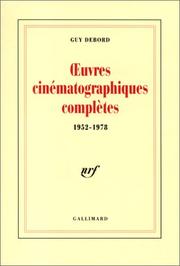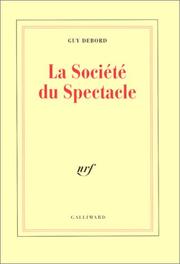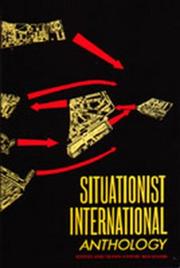| Listing 1 - 10 of 13 | << page >> |
Sort by
|

ISBN: 207074065X Year: 1994 Publisher: Paris Gallimard
Abstract | Keywords | Export | Availability | Bookmark
 Loading...
Loading...Choose an application
- Reference Manager
- EndNote
- RefWorks (Direct export to RefWorks)
Guy Debord --- film --- scenario's --- Debord Guy --- situationisme --- experimentele film --- 791.471 DEBORD --- Film --- anno 1950-1959 --- anno 1960-1969 --- anno 1970-1979
Book

ISBN: 3846762687 3770562682 Year: 2018 Publisher: Paderborn Brill | Fink
Abstract | Keywords | Export | Availability | Bookmark
 Loading...
Loading...Choose an application
- Reference Manager
- EndNote
- RefWorks (Direct export to RefWorks)
Bezeichnet man im deutschsprachigen Raum eine kulturelle Veranstaltung als »Spektakel«, geht damit oft eine negative Wertung einher. Im Gegensatz dazu zeigt der Band die vielfältigen Begriffsdimensionen, medialen Charakteristika und Funktionen dieser zentralen ästhetischen Kategorie in künstlerischen, epistemischen und politischen Kontexten auf. Beiträge aus Kunstgeschichte, Philosophie, Film-, Literatur-, Medien-, Tanz- und Theaterwissenschaft setzen sich mit ästhetischen Theorien und Praktiken des Spektakels von der Antike bis zur Gegenwart auseinander. Die behandelten Beispiele reichen von der christlichen Liturgie bis zur Barockoper, von Paulinus von Nola bis Christoph Schlingensief, vom populären Wissenschaftstheater des 19. Jahrhunderts bis zu politischen Funktionen des Spektakulären im südkoreanischen Kino oder dem italienischen Roman, in Alltag und Kunst des Sozialismus sowie der globalen Medienkultur.
Aesthetics --- Spectacular, The --- Arts --- Spectacle --- Philosophy --- Illusion --- Guy Debord --- Emotion --- Bildtheorie --- Begriffsgeschichte --- Jacques Rancière --- Schaulust --- Popularisierung von Wissen --- Louis Aragon --- Kulturgeschichte --- Theatralität
Book
ISBN: 9791032003107 9791032002995 Year: 2021 Publisher: Aix-en-Provence, France : Presses universitaires de Provence,
Abstract | Keywords | Export | Availability | Bookmark
 Loading...
Loading...Choose an application
- Reference Manager
- EndNote
- RefWorks (Direct export to RefWorks)
Les répliques de biens de consommation que les artistes zurichois Peter Fischli et David Weiss se sont mis à exécuter dès 1991 oscillent entre une superficialité, dont Fredric Jameson a fait un trait définitoire du postmodernisme, et un épaississement matériel propre aux choses. Ces images d’artefacts, dont on ne peut attendre aucun des services que rendent leurs modèles, nous ramènent pourtant constamment à la lente fréquentation d’objets dans l’usage quotidien qui informe notre vie. S’attachant à examiner la place qu’elles occupent dans l’histoire de l’art contemporain et à décrire notamment la relation qu’elles entretiennent avec les productions artistiques, littéraires, théoriques des années 1960, ce livre est aussi bien une réflexion sur le temps, tel que les œuvres le construisent.
Art --- Peter Fischli --- David Weiss --- superficialité --- chose --- Postmodernisme --- intérieur --- image --- valeur d’usage --- simulacre --- Surrogate --- polyuréthane --- Fredric Jameson --- Roland Barthes --- Guy Debord --- Jean Baudrillard --- Jean Bazin --- Paul Thek --- Robert Watts --- Gabriel Orozco --- Rachel Whiteread --- Heidi Bucher --- Peter Fischli David Weiss --- superficiality --- thing --- Postmodernism --- interior --- value of use --- simulacrum --- polyurethane --- Peter Fischli David Weiss --- Objet --- Choses --- Superficialité --- Image --- Intérieur --- Jean Baudrillard --- Guy Debord --- Fredric Jameson

ISBN: 207072803X 9782070728039 Year: 1992 Publisher: Paris Gallimard
Abstract | Keywords | Export | Availability | Bookmark
 Loading...
Loading...Choose an application
- Reference Manager
- EndNote
- RefWorks (Direct export to RefWorks)
La société du spectacle a été publié pour la première fois en 1967, ce livre étudiait systématiquement le processus de speculation dans la société occidentale et il a influencé la pratique de certains artistes des années 60/70. Guy Debord appartenait au mouvement Situationniste.
Psychologie sociale. --- Prolétariat --- Classes sociales. --- Société de consommation --- Proletariat. --- Guy Debord --- cultuurfilosofie --- maatschappij --- Frankrijk --- situationisme --- twintigste eeuw --- 130.2 --- Psychologie sociale --- Classes sociales --- Proletariat --- Internationale situationniste --- Situationnisme --- Ecrit théorique --- Communication --- Art et politique --- Social psychology. --- Social classes. --- 310 --- sociologie
Book
ISBN: 1911534459 1911534440 Year: 2017 Publisher: London, England : University of Westminster Press,
Abstract | Keywords | Export | Availability | Bookmark
 Loading...
Loading...Choose an application
- Reference Manager
- EndNote
- RefWorks (Direct export to RefWorks)
Spectacle 2.0 recasts Debord's theory of spectacle within the frame of 21st century digital capitalism. It offers a reassessment of Debord’s original notion of Spectacle from the late 1960s, of its posterior revisitation in the 1990s, and it presents a reinterpretation of the concept within the scenario of contemporary informational capitalism and more specifically of digital and media labour. It is argued that the Spectacle 2.0 form operates as the interactive network that links through one singular (but contradictory) language and various imaginaries, uniting diverse productive contexts such as logistics, finance, new media and urbanism. Spectacle 2.0 thus colonizes most spheres of social life by processes of commodification, exploitation and reification. Diverse contributors consider the topic within the book’s two main sections: Part I conceptualizes and historicizes the Spectacle in the context of informational capitalism; contributions in Part II offer empirical cases that historicise the Spectacle in relation to the present (and recent past) showing how a Spectacle 2.0 approach can illuminate and deconstruct specific aspects of contemporary social reality. All contributions included in this book rework the category of the Spectacle to present a stimulating compendium of theoretical critical literature in the fields of media and labour studies. In the era of the gig-economy, highly mediated content and President Trump, Debord’s concept is arguably more relevant than ever.
guy debord --- media studies --- commodification --- digital capitalism --- spectacle --- digital labour --- Social psychology --- Capitalism. --- Debord, Guy, --- Mass psychology --- Psychology, Social --- Human ecology --- Psychology --- Social groups --- Sociology --- Debord, G. --- D̲empor, Gky, --- Debord, Guy

ISBN: 9780939682041 Year: 2006 Publisher: Berkeley Bureau of public secrets
Abstract | Keywords | Export | Availability | Bookmark
 Loading...
Loading...Choose an application
- Reference Manager
- EndNote
- RefWorks (Direct export to RefWorks)
Radicalism --- Avant-garde (Aesthetics) --- Civilization. --- Radicalisme --- Avant-garde (Esthétique) --- Civilisation --- Internationale situationniste --- History --- Sources --- 7.038 --- situationisme --- Guy Debord --- kunst 20e eeuw --- kunstgeschiedenis - kunst na 1945 --- Avant-garde (Esthétique) --- Civilization --- Extremism, Political --- Ideological extremism --- Political extremism --- Political science --- Barbarism --- Auxiliary sciences of history --- Culture --- World Decade for Cultural Development, 1988-1997 --- Aesthetics --- Modernism (Art)
Book
ISBN: 1479890707 Year: 2019 Publisher: New York : Baltimore, Md. : New York University Press, Project MUSE,
Abstract | Keywords | Export | Availability | Bookmark
 Loading...
Loading...Choose an application
- Reference Manager
- EndNote
- RefWorks (Direct export to RefWorks)
In 1954, Dolores "Lolita" Lebrón and other members of the Puerto Rican Nationalist Party led a revolutionary action on the chambers of Congress, firing several shots at the ceiling and calling for the independence of the island. 'Ricanness: Enduring Time in Anticolonial Performance' begins with Lebrón's vanguard act, distilling the relationship between Puerto Rican subjectivity, gender, sexuality, and revolutionary performance under colonial time. Ruiz argues that Ricanness' continual performance of bodily endurance against US colonialism through different measures of time uncovers what's at stake politically for the often unwanted, anticolonial, racialized and sexualized enduring body. Moving among theatre, experimental video, revolutionary protest, photography, poetry, and durational performance art, 'Ricanness' stages scenes in which the philosophical, social, and psychic come together at the site of aesthetics, against the colonization of time. Analyzing the work of artists and revolutionaries like ADÁL, Lebrón, Papo Colo, Pedro Pietri, and Ryan Rivera, 'Ricanness' imagines a Rican future through the time travel extended in their aesthetic interventions, illustrating how they have reformulated time itself through nonlinear aesthetic practices.
Group identity in art. --- Arts, Puerto Rican --- Time and art --- Postcolonialism and the arts --- Themes, motives. --- Puerto Rico. --- ADÁL. --- Brownness. --- Da-sein. --- El Museo del Barrio. --- Frantz Fanon. --- Guy Debord. --- Hurricane Maria. --- Lolita Lebrón. --- Martin Heidegger. --- Nietzsche. --- Papo Colo. --- Pedro Pietri. --- Puerto Rican Nationalist Party. --- Puerto Rican. --- absurdism. --- aesthetics. --- colonialism. --- crisis. --- death drive. --- drama. --- dreaming. --- duration. --- emergency. --- endurance. --- existentialism. --- experimental. --- futural. --- imagination. --- looping. --- nonlinear time. --- performance art. --- philosophy. --- poetry. --- postcolonial. --- poverty. --- queer. --- racialized masculinity. --- rape. --- slow death. --- theater. --- unwantedness. --- video art. --- violence. --- vulgarity.
Book
Year: 2022 Publisher: Basel MDPI - Multidisciplinary Digital Publishing Institute
Abstract | Keywords | Export | Availability | Bookmark
 Loading...
Loading...Choose an application
- Reference Manager
- EndNote
- RefWorks (Direct export to RefWorks)
Beat Studies represent a vibrant field of intellectual inquiry, and this collection examines Beat culture as deeply infused with ecological themes. Allen Ginsberg invented the term "Flower Power" and Beat texts uncover the sources of our current existential climate predicament. This is the first edited collection to place the Beat Generation in conversation with the environment. A diverse number of contributors from Asia, Europe, and North America addresses essential environmental subjects and the deep ecological vision of the Beats.
Research & information: general --- Environmental economics --- Allen Ginsberg --- Beat Generation --- poetry --- poetics --- memory --- Guy Debord --- psychogeography --- landscape --- ecocriticism --- pilgrimage --- Geoffrey Chaucer --- The Canterbury Tales --- Jack Kerouac --- On the Road --- ecopoetics --- slow travel --- vernacular --- William S. Burroughs --- Naked Lunch --- dark ecology --- consumption --- control --- Timothy Morton --- speciesism --- consumerism --- mass extinction --- climate change --- environmental humanities --- posthuman --- non-philosophy --- Beat women --- eco-criticism --- green reading --- Diane di Prima --- Anne Waldman --- Kerouac --- frontier --- ecotopia --- ecopoetry --- New York School --- New American Poetry --- reparative reading --- environment --- Black Mountain --- Queer --- Ghost of Chance --- Yage Letters --- Madagascar --- experimental film --- cyberpunk --- nature --- sound --- animals --- beat generation --- comparative literature --- white shamanism --- Beat poetry --- anthropocentric materialism --- Buddhist poetics --- biotic community
Book
Year: 2022 Publisher: Basel MDPI - Multidisciplinary Digital Publishing Institute
Abstract | Keywords | Export | Availability | Bookmark
 Loading...
Loading...Choose an application
- Reference Manager
- EndNote
- RefWorks (Direct export to RefWorks)
Beat Studies represent a vibrant field of intellectual inquiry, and this collection examines Beat culture as deeply infused with ecological themes. Allen Ginsberg invented the term "Flower Power" and Beat texts uncover the sources of our current existential climate predicament. This is the first edited collection to place the Beat Generation in conversation with the environment. A diverse number of contributors from Asia, Europe, and North America addresses essential environmental subjects and the deep ecological vision of the Beats.
Allen Ginsberg --- Beat Generation --- poetry --- poetics --- memory --- Guy Debord --- psychogeography --- landscape --- ecocriticism --- pilgrimage --- Geoffrey Chaucer --- The Canterbury Tales --- Jack Kerouac --- On the Road --- ecopoetics --- slow travel --- vernacular --- William S. Burroughs --- Naked Lunch --- dark ecology --- consumption --- control --- Timothy Morton --- speciesism --- consumerism --- mass extinction --- climate change --- environmental humanities --- posthuman --- non-philosophy --- Beat women --- eco-criticism --- green reading --- Diane di Prima --- Anne Waldman --- Kerouac --- frontier --- ecotopia --- ecopoetry --- New York School --- New American Poetry --- reparative reading --- environment --- Black Mountain --- Queer --- Ghost of Chance --- Yage Letters --- Madagascar --- experimental film --- cyberpunk --- nature --- sound --- animals --- beat generation --- comparative literature --- white shamanism --- Beat poetry --- anthropocentric materialism --- Buddhist poetics --- biotic community
Book
Year: 2022 Publisher: Basel MDPI - Multidisciplinary Digital Publishing Institute
Abstract | Keywords | Export | Availability | Bookmark
 Loading...
Loading...Choose an application
- Reference Manager
- EndNote
- RefWorks (Direct export to RefWorks)
Beat Studies represent a vibrant field of intellectual inquiry, and this collection examines Beat culture as deeply infused with ecological themes. Allen Ginsberg invented the term "Flower Power" and Beat texts uncover the sources of our current existential climate predicament. This is the first edited collection to place the Beat Generation in conversation with the environment. A diverse number of contributors from Asia, Europe, and North America addresses essential environmental subjects and the deep ecological vision of the Beats.
Research & information: general --- Environmental economics --- Allen Ginsberg --- Beat Generation --- poetry --- poetics --- memory --- Guy Debord --- psychogeography --- landscape --- ecocriticism --- pilgrimage --- Geoffrey Chaucer --- The Canterbury Tales --- Jack Kerouac --- On the Road --- ecopoetics --- slow travel --- vernacular --- William S. Burroughs --- Naked Lunch --- dark ecology --- consumption --- control --- Timothy Morton --- speciesism --- consumerism --- mass extinction --- climate change --- environmental humanities --- posthuman --- non-philosophy --- Beat women --- eco-criticism --- green reading --- Diane di Prima --- Anne Waldman --- Kerouac --- frontier --- ecotopia --- ecopoetry --- New York School --- New American Poetry --- reparative reading --- environment --- Black Mountain --- Queer --- Ghost of Chance --- Yage Letters --- Madagascar --- experimental film --- cyberpunk --- nature --- sound --- animals --- beat generation --- comparative literature --- white shamanism --- Beat poetry --- anthropocentric materialism --- Buddhist poetics --- biotic community --- Allen Ginsberg --- Beat Generation --- poetry --- poetics --- memory --- Guy Debord --- psychogeography --- landscape --- ecocriticism --- pilgrimage --- Geoffrey Chaucer --- The Canterbury Tales --- Jack Kerouac --- On the Road --- ecopoetics --- slow travel --- vernacular --- William S. Burroughs --- Naked Lunch --- dark ecology --- consumption --- control --- Timothy Morton --- speciesism --- consumerism --- mass extinction --- climate change --- environmental humanities --- posthuman --- non-philosophy --- Beat women --- eco-criticism --- green reading --- Diane di Prima --- Anne Waldman --- Kerouac --- frontier --- ecotopia --- ecopoetry --- New York School --- New American Poetry --- reparative reading --- environment --- Black Mountain --- Queer --- Ghost of Chance --- Yage Letters --- Madagascar --- experimental film --- cyberpunk --- nature --- sound --- animals --- beat generation --- comparative literature --- white shamanism --- Beat poetry --- anthropocentric materialism --- Buddhist poetics --- biotic community
| Listing 1 - 10 of 13 | << page >> |
Sort by
|

 Search
Search Feedback
Feedback About UniCat
About UniCat  Help
Help News
News